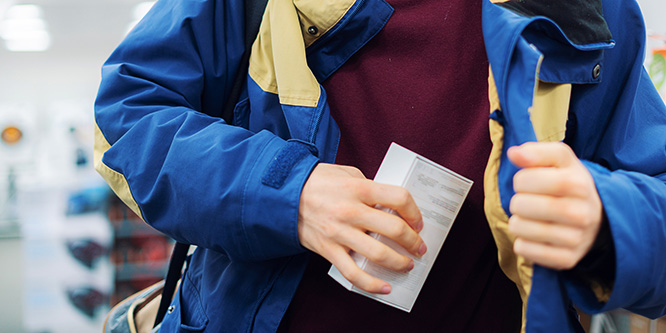
Photo: iStock | Михаил Руденко
April 13, 2023
Is Shoplifting Killing Store Morale?
A university study finds mandatory policing of shoplifting and other “customer deviant behavior” often produces strong negative emotions in retail associates, leading to perceptions of unfairness and increased turnover.
Research from Florida Atlantic University and three other schools based on a series of in-depth interviews, three experiments and a survey found:
- Employees expect managers to be more active in guarding the store.
- More than a quarter of respondents don’t know their employers’ policies for guarding the store.
“Front-line employees [FLE] are being asked to do too much, policing the misbehavior and confronting shoplifters, often without extra money or training,” said Melanie Lorenz, Ph.D., an associate marketing professor at Florida Atlantic University’s College of Business.
David Johnston, VP, asset protection and retail operations at the National Retail Federation, in a recent blog entry, said shoplifting and retail theft had reached an “epidemic level,” with “brazen” thieves openly stealing and stores closing or shortening hours to avoid theft.
Most retailers have a policy against associates chasing or physically confronting suspected shoplifters. The approach is intended to protect the safety of associates and avoid the risk of racially profiling innocent shoppers.
Still, standard practice calls for store associates to alert their managers of a potential shoplifting situation. Associates are also told working the floor discourages shoplifting.
A Shopify blog entry exploring return fraud encourages retail associates to ask additional questions to “weed out bad actors from legitimate returners.”
In a Houston Chronicle article exploring shoplifting’s impact, Neil Kokemuller writes, “Employees may feel a sense of paranoia if they constantly hear the store has a shoplifting issue. The negative measures taken to deter shoplifting can impede employee instincts toward a positive and welcoming attitude with customers. Employees also may become overly suspicious of customers and get overzealous in their efforts to protect the store’s inventory.”
A Harlem View article also noted that shoplifting makes staff uncomfortable. Nejah, an associate at a Harlem pharmacy who declined to give his last name, said, “Retail or working somewhere where you have to worry about shoplifting is definitely a crazy experience.”
Discussion Questions
DISCUSSION QUESTIONS: What can stores do to counter the negative impact on morale that frequent shoplifting might have? What, if anything, should store associates be expected to do to deter shoplifting?
Poll
BrainTrust
John Lietsch
CEO/Founder, Align Business Consulting
Nikki Baird
VP of Strategy, Aptos
Ryan Mathews
Founder, CEO, Black Monk Consulting
Recent Discussions







From my experience: it sure could be. You work in a store to sell merchandise you believe in, meet people and have fun, NOT to spend your time confronting someone you saw stick something in their coat. It’s worse than a bummer. No one works at retail to be a police-person, no one except the police people. There are clear prevention methods but if it gets really bad, finding people to work with you will become very difficult.
Stores need to reinvest in security and loss prevention, full stop. Too much of it has been cut, and there is too much reliance on police–or frontline workers–as security. Store associates are far more likely to choose retail as a job because they want to help customers, not because they want to confront them over shoplifting, so it’s no shocker that they’d quit over being asked to perform a fairly risky behavior, with no training or no compensation for that risk.
When I worked in store ops, we explicitly told employees that they were NOT to confront shoplifters, though they could certainly engage with someone who looked like they might be thinking about it, as a potential preventive measure. They were expected to call LP in to deal with unruly or misbehaving (or lawbreaking) customers.
It comes down to accountability, too. If a store doesn’t hold shoplifters accountable, then it becomes a free-for-all. A store like that just isn’t going to last, not least because no one is going to want to work there. I don’t know if the numbers are out there — how much did retailers spend on LP and security 20 or 30 years ago vs. now? I would bet there has been a significant reduction — and now they’re paying the price, on multiple levels.
Nikki,
That is the thing- Retailers made investments in shrink/loss prevention through cameras, dashboard reporting, etc even up to a few years ago but local laws have changed this – more so than even a few years ago and shoplifters are no longer accountable. In my youth, I worked in stores, and yes we engaged with shoppers that thought about taking product. I learned my lesson though when I did run after a shoplifter (they had a full basket of ribeyes)and they pulled a weapon on me. No one likes to shop in a store where you have to find someone to open a case to shop for an item. I don’t know when the pendulum will swing back, but it won’t be before retailers shut down more locations due to shrink/theft overwhelming their bottom lines.
Hello everyone. Is was like 4 wisdom teeth extractions to get approved here. My name is Shon Moore. I tripped over this thread because I have done LP for a minute. All y’all’s comments are very eloquently and accurately written. I had to join.
I am a 51 year old white male with a large pedigree. I own 5 black belts and was and ESPN (and many other sanctioning bodies) kickboxer/Muay Thai. I train Sacramento SWAT and Folsom PD.
I have some thoughts on this rampant lawlessness that is being allowed to ensue. Many get in my face. They call me a wolverine, chicken hawk, badger, ninja, etc.
My stature is very imposing and I have the gift of gab. I am confident that I can contribute here with my experience.
Now that’s out the way… Retail (in general) truly does not want to stop shoplifting. They should ALWAYS have a person on the floor and ALWAYS have the front door covered.
And when we take breaks, the managers should be stepping in to cover the front door. That being said…
CEOS don’t need (or deserve) $500k annual bonuses that shortchange payroll (nobody should be that greedy) and then complain when folks run out with laundry baskets full of merch.
That’s just effin ludicrous.
I am open for rubuttals or further retorts
It’s an untenable position for retail associates to be in. I was in Downtown Los Angeles in a store when a crazy person tried to jump over the counter. While security took him out, the cashier said, “Happens all the time.” This is bad enough but a lot of movies still think it is cool to show people shoplifting.
The first thing retailers should do is thoroughly go over the shoplifting protocols with each new hire. The next thing they should do is explain “why” the policy is what it is. This should be followed by educating the new hire about the types of shoplifters. There’s a huge difference in how you handle a teenager shoplifting a single item and “sweepers” who can clear entire displays in a matter of seconds. The teenager can be intimidated. The sweeper — and there are more and more of them every day — knows the ropes and the regulations, often better than the associate on the floor. If a retailer has a policy of actively discouraging shoplifting there are simple steps associates can take such as asking a person they have seen shoplift if they can hold the specific item for them behind the register so the “customer” can continue shopping more conveniently. There are problems with every security approach. Obviously you don’t want an employee and/or customer or customers hurt. Also, different cities have different laws and an employee can easily find themselves in as much, or more, trouble than the shoplifter. And, whatever the policy, the problem is it isn’t really theft until the merchandise leaves the store and once its left the store most stores’ policies prohibit an associate from following a suspected shoplifter out the door. So it’s a security Catch-22.
The fact that we’re trying to solve this at the retail level is a depressing indication of the multiple failures at other levels of our society. The policy to just let shoplifters walk is unfortunately the best policy to avoid confrontation and keep store employees safe. I don’t think being on the floor will deter the most brazen of thieves but it might help with the opportunistic ones. Unfortunately, stores will continue to limit operating hours or shut down altogether until the issue is finally addressed at its proper place.
At my local Target, at least 15 percent of the merchandise is behind lock and key, and I live in an affluent area. Shoplifting DOES affect associate morale, and stores must take steps to protect the merchandise and the people who work for the company. It’s very sad.
More retailers are implementing safety policies that prevent employees from confronting thieves. This makes a lot of sense as employees shouldn’t be putting themselves at any risk, but it also makes staff feel helpless as they watch people walk out with stolen goods. And most staff don’t get to see the security work being done after the theft which further stokes feelings of frustration. This hurts everyone — staff won’t stay, customers won’t come in and, ultimately, retailers will close high theft locations which hurts the community.
Some Shoprite stores (Wakefern) have installed facial recognition software upon entry to the store and at self-checkout. They build a database of know offenders and then loss prevention identifies them when they come in the store. They may dispatch someone to be around them when they shop. This appears to be a proactive and store associate-friendly approach to this ongoing challenge.
The solution is to ban “scan-and-go” proposals. No, seriously, there isn’t, of course a “solution”: stores have a variety of conflicting – if not outright contradictory – goals, and they must necessarily choose among them; for the most part they seem to emphasize non-confrontation/employee safety, and while that may frustrate (some) people, it’s perfectly understandable (we should consider, tho, the possibility of a negative feedback loop where this increases the incidence rate and ultimately decreases safety).
All that having been said, one point – “working the floor discourages shoplifting” – was made that hopefully won’t be ignored…but easier said than done when you assign one person to a 20,000 square foot floor.
Anyone who has dealt one on one with a clearly shoplifted return knows how disheartening that interaction can be. It’s the full scope of the experience which is not only in the deterrence of the act (which can be skillfully choreographed by the shoplifters and next to impossible to impede) but dealing with the frustration of taking product back as a return knowing the business has been duped. Giving employees the tools/words to deal with these transactions as painlessly as possible would go a long way to reducing the negative impact on morale.
Brazen retail theft continues post-pandemic, while store employees are increasingly having the hold a bag they don’t want, or shouldn’t have to own. They know the partly trained mall security can only do so much, and that many cities have nowhere near the baseline police force capacity they used to. It can feel helpless, jarring and it hurts morale.
Retailers and their respective chambers of commerce need to remain vocal to their locally elected leaders, demanding adequate police resources and presence to operate a business safely on any street in America. Or they’ll continue to leave/shut down.
The NRF, and individual chains, need to advocate for change at the local and national level. What store level associate would want to (or be motivated to) try to actively stop shoplifting beyond calling the police? Depending on the store, perhaps hire security and make them visible?
It must be. How are we to further encourage people to build a career in front-line retail when this problem is now at epidemic levels and store associates have to fear for their safety.